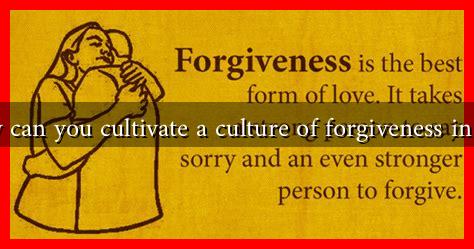-
Table of Contents
How to Cultivate a Culture of Forgiveness in Love
Forgiveness is a powerful tool in any relationship, especially in romantic partnerships. It fosters understanding, strengthens bonds, and promotes emotional well-being. However, cultivating a culture of forgiveness requires intentional effort and commitment from both partners. This article explores practical strategies to nurture forgiveness in love, supported by research and real-life examples.
The Importance of Forgiveness in Relationships
Forgiveness is not merely about letting go of grudges; it is a conscious decision to release feelings of resentment and anger. According to a study published in the journal *Personal Relationships*, couples who practice forgiveness report higher levels of relationship satisfaction and emotional intimacy. Here are some key benefits of forgiveness in love:
- Improved Communication: Forgiveness encourages open dialogue, allowing partners to express their feelings without fear of judgment.
- Emotional Healing: Letting go of past hurts can lead to emotional relief and a healthier mental state.
- Stronger Bonds: Couples who forgive each other often develop deeper trust and connection.
- Conflict Resolution: Forgiveness can help resolve conflicts more effectively, preventing them from escalating.
Strategies to Cultivate Forgiveness
Creating a culture of forgiveness in love involves several actionable strategies. Here are some effective methods:
1. Open Communication
Encouraging open and honest communication is vital for fostering forgiveness. Partners should feel safe discussing their feelings and grievances without fear of retaliation. Here are some tips:
- Practice active listening: Show genuine interest in your partner’s feelings.
- Use “I” statements: Express your feelings without blaming your partner (e.g., “I felt hurt when…”).
- Schedule regular check-ins: Set aside time to discuss any issues that may arise.
2. Acknowledge and Validate Feelings
Recognizing and validating each other’s feelings is crucial in the forgiveness process. When partners acknowledge each other’s pain, it fosters empathy and understanding. Consider the following:
- Express empathy: Show that you understand your partner’s feelings.
- Apologize sincerely: A genuine apology can go a long way in healing wounds.
- Reassure your partner: Let them know that their feelings are valid and important.
3. Practice Self-Forgiveness
Forgiveness starts from within. Partners must learn to forgive themselves for their mistakes before they can forgive each other. Self-forgiveness can be cultivated through:
- Reflecting on personal growth: Acknowledge how past mistakes have contributed to your development.
- Engaging in self-compassion: Treat yourself with kindness and understanding.
- Seeking professional help: Therapy can provide valuable tools for self-forgiveness.
4. Create a Forgiveness Ritual
Establishing a ritual can help reinforce the commitment to forgiveness. This could be as simple as a weekly discussion about any grievances or a more structured approach, such as writing letters of forgiveness to each other. Rituals can help solidify the practice of forgiveness in your relationship.
Real-Life Examples and Case Studies
Many couples have successfully cultivated a culture of forgiveness. For instance, a study conducted by the *Journal of Family Psychology* found that couples who engaged in forgiveness rituals reported a 50% reduction in relationship conflict over six months. Another example is the story of John and Sarah, who faced significant challenges in their marriage. By committing to weekly check-ins and practicing empathy, they transformed their relationship, leading to a deeper connection and mutual respect.
Conclusion
Forgiveness is an essential component of a healthy and loving relationship. By fostering open communication, acknowledging feelings, practicing self-forgiveness, and creating rituals, couples can cultivate a culture of forgiveness that strengthens their bond. Remember, forgiveness is not a one-time act but a continuous process that requires effort and commitment. As you embark on this journey, you will likely find that the rewards—greater intimacy, trust, and emotional well-being—are well worth the effort.
For further reading on the importance of forgiveness in relationships, consider exploring resources from the American Psychological Association.


